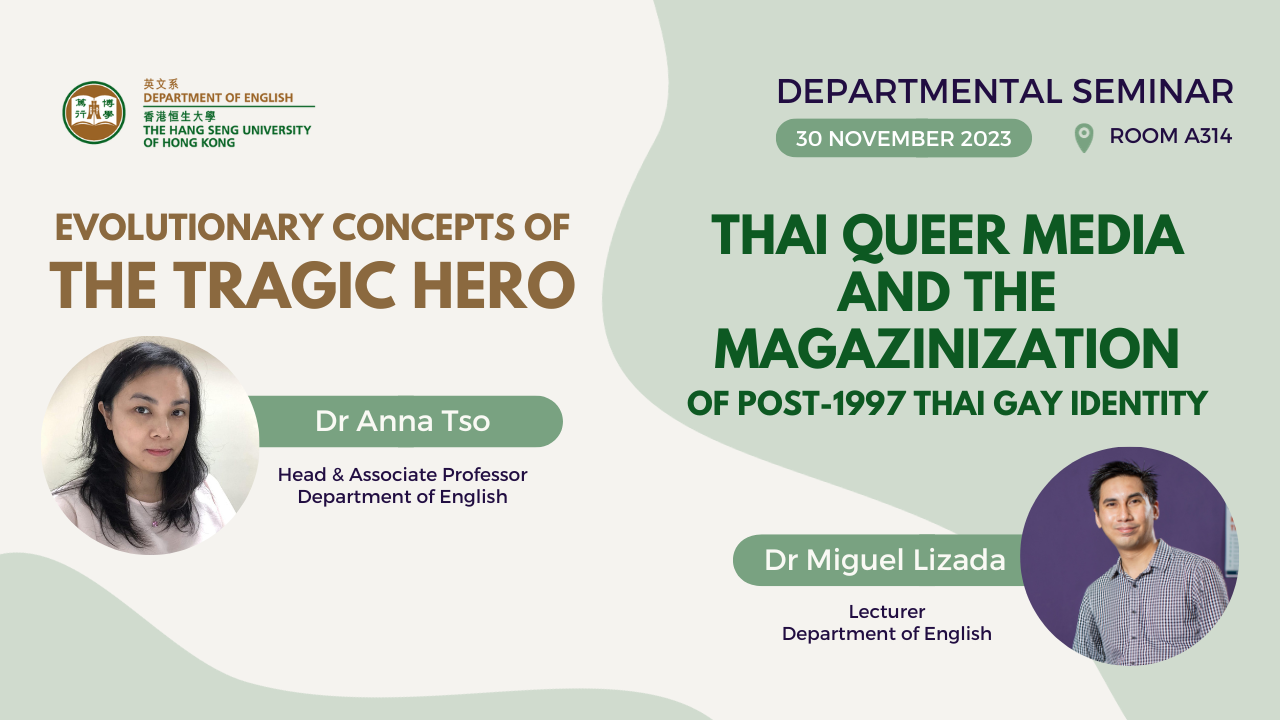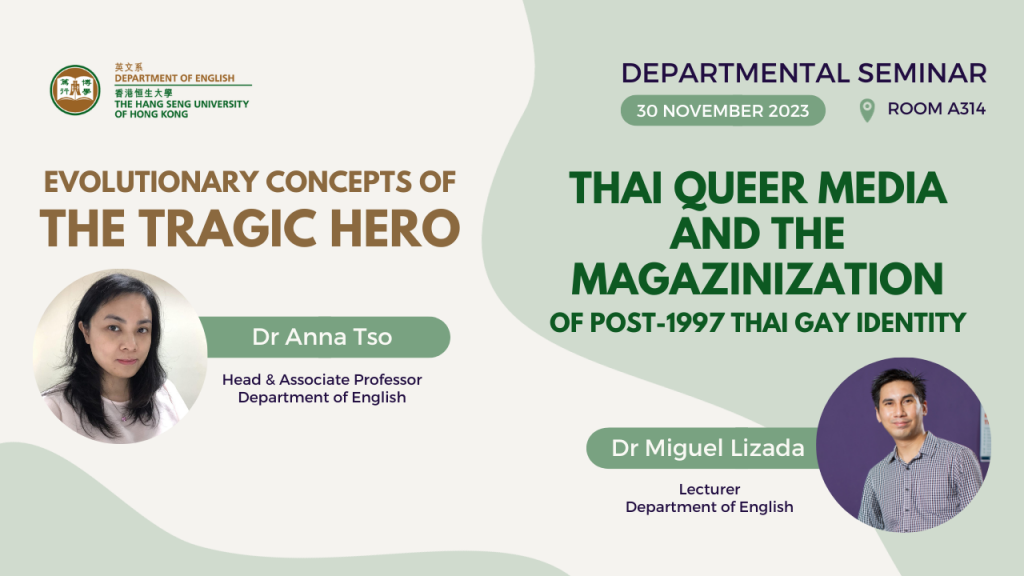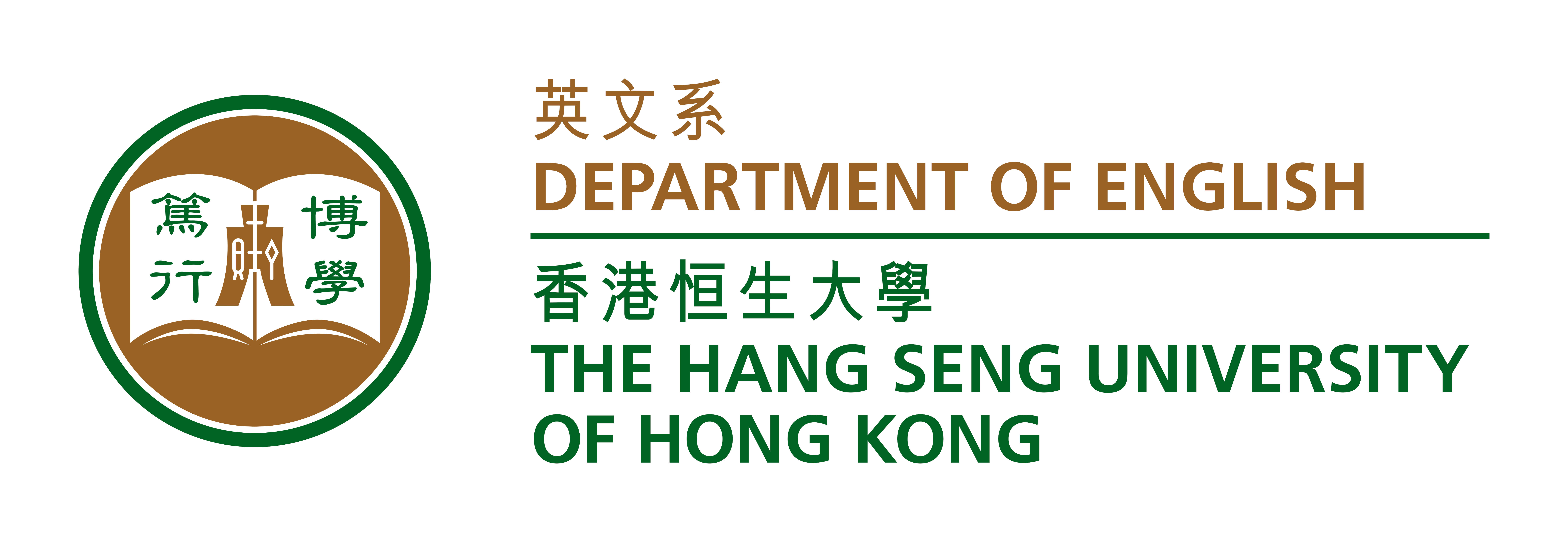

The English Department cordially invites you to join our departmental seminar, Evolutionary Concepts of the Tragic Hero and Thai Queer Media and the Magazinization of Post-1997 Thai Gay Identity, to be organized on 30 November 2023 (Thursday).
Date: 30 November 2023 (Thursday)
Venue: Room A314, S H Ho Academic Building
Registration: Complete this online form to reserve a seat. Available on a first-come-first-served basis.
Remarks: 1 iGPS unit will be awarded to undergraduate students who attend the seminar
| Seminar 1 Evolutionary Concepts of the Tragic Hero | Seminar 2 Thai Queer Media and the Magazinization of Post-1997 Thai Gay Identity |
| Time: 1:45pm Speaker: Dr Anna Tso, Head and Associate Professor of Department of English | Time: 2:30pm – 3:30pm Speaker: Dr Miguel Lizada, Lecturer of Department of English |
| Abstract Difference cultures across different time periods may have different understandings about what a tragic hero is. In ancient Greek drama, as Aristotle defines in The Poetics (335 B.C.), a tragic hero is a literary character of noble birth who, at the beginning of the tragedy, is highly renowned and well-respected for his virtuous and heroic qualities. Due to hamartia, the tragic hero falls to his/her destruction, experiences peripeteia, and goes through anagnorisis. While tortured by immense pain and suffering, the tragic hero must show courage, dignity, and a nobility of spirit in the face of his/her defeat and accept his/her tragic fate. The undeserved tragic consequences of the tragic hero’s downfall are expected to create catharsis among the audience. The Aristotelian definition of the tragic hero seems essentially static, but the ever-changing society and demands of life call for constant changes in the structural form of tragedy, as well as the concept of a tragic hero. In this presentation, the speaker will walk you through various forms of tragedy that thrive in the Middle Ages, the Renaissance, and the modern period. The changing traits of the tragic hero across time are examined. | Abstract In recent years, mainstream Thai entertainment industries have been at the forefront of producing queer-themed cultural texts and forms. For instance, Boys Love (BL) lakhon (Thai television series) circulating in global screens have been positioned to cultivate Thai soft power (as a way to compete with the juggernaut that is the Korean Wave). This presentation examines the ways in which this deployment is both harnessed and ultimately contained. It argues that the template by which such deployment is enacted could be traced to the relationship between Thai sexual politics and the kingdom’s political economy in the aftermath of the 1997 Asian financial crisis. While the influx of foreign capital enabled by trade liberalization introduced new forms of queer subjectivity and modes of queer consumption, such shifts were limited by heteronationalist paradigms of the Thaksin administration. I use the film Metrosexual (2006) as an illustrative text for how gender-bending comedy documents and interrogates this tension between sexual politics and the nation-state through a process called magazinization. Through a close reading of the film and a previewing of the queer-themed texts that were produced alongside and after the film, I demonstrate how magazinization is a strategic process that calcifies the ambiguous attitudes of the nation-state towards emergent subjectivities in the new Thai sexual economy – tolerated and championed for their ability to add value to the so-called purple baht, but only to the extent that they do not shatter the fragile structure of the family in the age of neoliberalism and heteronationalist conservatism. |
| Bio Dr Anna Tso is Department Head and Associate Professor of English at The Hang Seng University of Hong Kong. Previously, she was the Director of the Research Institute for Digital Culture and Humanities and Programme Leader of the MA in Applied English Linguistics at the Hong Kong Metropolitan University (formerly The Open University of Hong Kong). As President of the Hong Kong Association for Educational Communications and Technology (HKAECT), she is lead editor of the books Critical Reflections on ICT and Education (Forthcoming, Springer), The Post-pandemic Landscape of Education and Beyond (2023, Springer), and Digital Communication and Learning: Changes and Challenges (2022, Springer). Her research interests lie in the intersection of children’s literature, gender studies, applied linguistics, and digital literacy. | Bio Dr Miguel Antonio Lizada received his PhD in Comparative Literature from The University of Hong Kong. He is also an alumnus of the School of Criticism and Theory at Cornell University and the Institute for World Literature at Harvard University. His research areas are Contemporary Asian Literatures in English, World Cinema and Literature, and Gender and Sexuality. He is also a creative writer who writes poetry and non-fiction. In 2015, he was one of the recipients of the Don Carlos Palanca Memorial Awards for Literature, one of the oldest and most prestigious national literary awards in the Philippines. He is also an occasional theater actor and has performed in Filipino adaptations of Samuel Beckett’s Waiting for Godot and Niccolo Machiavelli’s La Mandragola. |
For enquiries, please feel free to contact us at eng@hsu.edu.hk.


